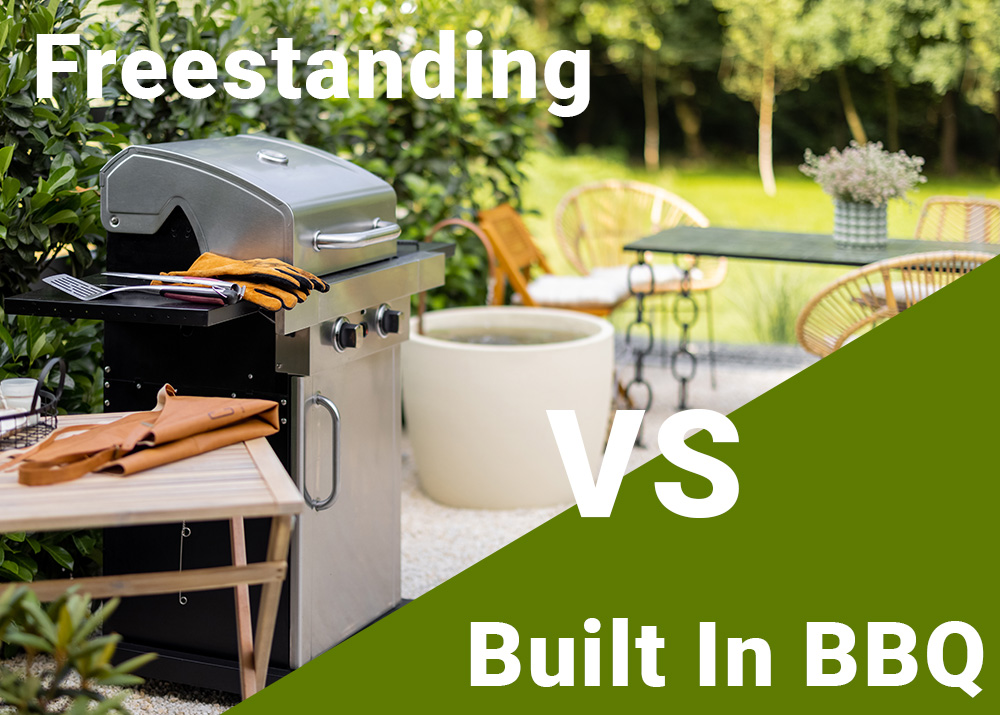Blog
Built-In BBQ vs. Freestanding: Which is Right for Your Outdoor Kitchen?

When planning an outdoor kitchen, one of the first choices you’ll face is deciding between a built-in BBQ or a freestanding grill. Each option has its own benefits and drawbacks, and the right choice depends on your cooking style, available space, and long-term vision for your outdoor space. Let's dive into the pros and cons of each to help you make the best decision for your lifestyle.
Built-In BBQs: The Ultimate in Outdoor Elegance
Pros:
- Seamless Integration
Built-in BBQs are designed to be part of a larger outdoor kitchen setup, providing a cohesive look and feel. This type of grill integrates smoothly into countertops, cabinets, and surrounding structures, giving your backyard an elegant and professional finish. - Enhanced Property Value
Since built-in BBQs are permanent fixtures, they can add significant value to your home. Potential buyers often see an outdoor kitchen as an attractive feature, especially in Melbourne where outdoor living is popular. - Sturdy and Long-Lasting
Built-in BBQs are usually crafted from high-quality materials, like stainless steel, that withstand outdoor conditions over time. With proper maintenance, these grills can last for years, making them a great long-term investment. - Customisation Options
From adding storage cabinets and a pizza oven to integrating sinks and refrigeration, built-in BBQs allow for complete customisation. This flexibility lets you design the perfect outdoor kitchen setup that meets all your cooking and entertaining needs.
Cons:
- Higher Initial Cost
Built-in BBQs generally cost more upfront than freestanding options, especially when you factor in the surrounding materials, installation, and any necessary utilities. They are often considered a luxury investment. - Less Flexibility
Since built-in BBQs are permanent fixtures, you’ll be committed to that specific layout and location. If you’re someone who likes to rearrange or redesign your space regularly, a built-in may not be the best choice. - Professional Installation Required
Installing a built-in BBQ often involves gas, electrical, or plumbing work, which may require professional help to ensure everything meets safety codes. This can add to the overall expense and timeline of the project.
Freestanding BBQs: Versatility and Convenience
Pros:
- Portability and Flexibility
One of the biggest advantages of freestanding BBQs is their mobility. You can easily move the grill to different areas of your backyard, which is ideal if you like rearranging your outdoor space or need flexibility. - Lower Cost
Freestanding grills are typically more affordable than built-in BBQs, making them a great choice for those on a budget. They don’t require installation and are often ready to use straight out of the box, saving time and additional costs. - Easy to Replace
If you want to upgrade or change grills in the future, swapping out a freestanding BBQ is simple and less costly. This flexibility allows you to try different grilling technologies or sizes without making permanent changes. - Variety of Options
Freestanding BBQs come in a wide range of sizes, styles, and fuel types (like gas, charcoal, or electric), giving you a broad selection to suit your grilling style and space. Many models also include features like side burners, storage, and wheels for added convenience.
Cons:
- Limited Customisation
Unlike built-in BBQs, freestanding grills don’t offer the same customisation options. If you’re looking for a comprehensive outdoor kitchen setup with counter space, refrigeration, or integrated sinks, a freestanding grill may not fit the bill. - Less Aesthetic Appeal
While freestanding BBQs can still look great, they may not offer the seamless and cohesive appearance of a built-in BBQ. They can look out of place in a well-designed outdoor kitchen, especially in more upscale backyard settings. - Less Durable for Outdoor Conditions
Since freestanding BBQs are often exposed to the elements, they may not last as long as built-in models without regular maintenance. Even with a cover, they may be more susceptible to wear and tear over time.
Which is Right for You?
When deciding between a built-in BBQ and a freestanding grill, consider these questions:
- How often do you entertain outdoors? If you frequently host gatherings, a built-in BBQ may provide the comprehensive setup and convenience you need. For more occasional use, a freestanding grill might be enough.
- Do you plan on staying in your home long-term? A built-in BBQ is a long-term investment that adds property value, making it a smart choice if you’re settled. For those who may move within a few years, a freestanding option is more portable and flexible.
- What’s your budget? Built-in BBQs often require a higher upfront cost due to installation and customisation, while freestanding models offer quality grilling options at a more affordable price point.
- How much space do you have? Built-in BBQs require dedicated outdoor space, while freestanding BBQs can be placed wherever you have room and moved as needed.
Conclusion
Both built-in and freestanding BBQs have their unique advantages, and choosing the right one depends on your lifestyle, budget, and outdoor space. If you dream of a fully-equipped, permanent outdoor kitchen that feels like an extension of your home, a built-in BBQ is a fantastic choice. However, if you prioritise flexibility, affordability, and the freedom to move or replace your grill, a freestanding BBQ will serve you well.
Whatever you choose, both options can transform your outdoor space into a fantastic area for cooking, gathering, and creating lasting memories with family and friends.
View our range of built in BBQs and Freestanding BBQs

